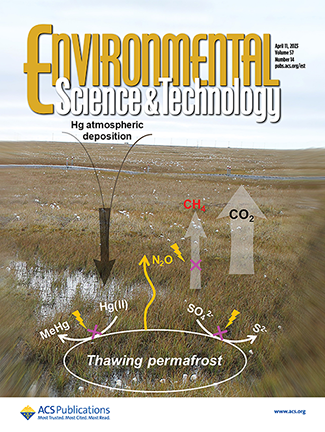Nitrous Oxide Inhibits Methylmercury and Methane Formation in Arctic Tundra Soils
Study highlights the complex interplay of microbial processes that determine how climate change may influence greenhouse gas and toxic methylmercury formation in the Arctic.
March 28, 2023

Permafrost thaw and organic matter degradation could release nitrous oxide, a potent greenhouse gas that in turn inhibits mercury methylation and methanogenesis (methane formation). This research highlights the complex interplay of microbial processes that determine how climate change may influence greenhouse gas and methylmercury formation in the Arctic.
[Reprinted with permission from Zhang, L., et al. "Inhibition of Methylmercury and Methane Formation by Nitrous Oxide in Arctic Tundra Soil Microcosms." Environmental Science and Technology 57 (14), 5655–65 (2023). DOI:10.1021/acs.est.2c09457. Copyright 2023 American Chemical Society.]
The Science
Climate warming causes permafrost thaw predicted to increase methane (CH4), carbon dioxide (CO2), and toxic methylmercury (MeHg) formation, as well as nitrous oxide (N2O), another potent greenhouse gas formed during degradation of nitrogen-containing soil organic matter in the Arctic.
A microcosm incubation study with Arctic tundra soil over 145 days demonstrated that N2O at concentrations as low as 0.1 mM markedly inhibited microbial MeHg formation, methanogenesis, and sulfate reduction while slightly promoting CO2 production. Microbial community analyses indicate that N2O decreased the relative abundances of methanogenic archaea and microbial clades implicated in sulfate reduction and MeHg formation. Following depletion of N2O, both MeHg formation and sulfate reduction rapidly resumed, whereas CH4 production remained low, suggesting that N2O affected susceptible microbial guilds differently.
MeHg formation strongly coincided with sulfate reduction, supporting prior reports linking sulfate-reducing bacteria (SRB) to MeHg formation in the Arctic soil. Our results suggest that microbial production of CH4, CO2, and MeHg is more complicated than previously thought. This research demonstrates complex biogeochemical interactions governing CH4 and MeHg formation and thus lays the foundation for future mechanistic studies for improved predictive understanding of MeHg and greenhouse gas fluxes from thawing permafrost ecosystems.
The Impact
We observe that N2O strongly inhibits MeHg and CH4 production in Arctic permafrost, which is considered a critical-zone environment for MeHg formation and greenhouse gas (e.g., CH4, CO2, N2O) emissions under climate warming scenarios. The observed inhibitory effects of N2O have important implications for predicting the formation of neurotoxic MeHg and greenhouse gas emissions in Arctic ecosystems.
Summary
Climate warming causes permafrost thaw and soil organic matter degradation, resulting in the formation and release of CH4, CO2, N2O, and toxic MeHg in the Arctic. We found that N2O strongly inhibits CH4 and MeHg formation, suggesting that microbial production of CH4, CO2, and MeHg is more complicated than previously thought. The complex interplay of microbial processes ultimately may determine how climate change will influence greenhouse gas formation and mercury transformation in the anoxic Arctic tundra.
References
Zhang, L., et al. "Inhibition of Methylmercury and Methane Formation by Nitrous Oxide in Arctic Tundra Soil Microcosms." Environmental Science and Technology 57 (14), 5655–65 (2023). https://doi.org/10.1021/acs.est.2c09457.